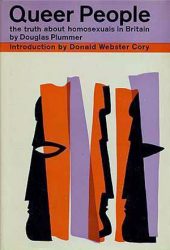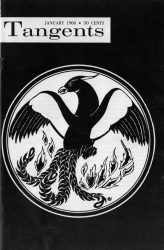 Queer People: The Truth about Homosexuals in Britain
Queer People: The Truth about Homosexuals in Britain
By Douglas Plummer
Introduction by Donald Webster Cory
Published by Citadel Press, NY
Published January 1, 1965 ($3.00)
Sociology (Britain)
122 pgs. • Find on Amazon.com
Reviewed by “J. C.”[1]James Colton?
January 8, 1966.
In his foreword, the pseudonymous Mr. Plummer writes that this book grew out of a series of articles intended for publication in one or another of Britain’s mass-circulation dailies. The articles, purportedly pleading the homosexual’s case from the homosexual’s own viewpoint, for benefit of the ignorant man on the street, were rejected.
It is too bad book publishers had not the same discretion. For, if Plummer’s intentions were good, their result is a disaster.
First, Queer People, as its title would suggest, is written in Dick and Jane style. Plummer’s estimate of the intelligence of his audience makes one wince. It is not, in fact, an estimate—it is a contempt. Writing down to adults as if they were six years old is no way to influence them.

January 1966
Throughout his book, Plummer insists upon the term “queer” instead of “homosexual.” The latter term he fears might offend readers. He means to woo them by indulging their prejudices. Or perhaps the explanation lies elsewhere. Plummer may just have trouble spelling long words. His prose style and grammatical failings would suggest this.
Queer People is a maddening book. It is hard to remain temperate in criticizing it.
It is bound to have the opposite effect to that which the author alleges he meant it to have. Its constant references to “us” and “we” only succeed in simplifying for the reader his predisposition to lump all homosexuals into an isolated and alien group.
That Plummer keeps mentioning that your bus conductor, lorry driver, butcher, dentist may be “queer” in no way mitigates his persistent emphasis on the “difference” between homosexuals and all those wonderful, normal people, his readers. His insistence upon the figure of one million male homosexuals in England in no way alters his repeated implication of “queers” as a minority of untouchables.
He repeatedly—from his untenable “us” and “we” position—makes generalizations that are enough to send intelligent homosexuals climbing the walls. “Queers” have no Interest in politics, no interest in sports. Maybe the “queers” he runs with don’t, but at one point in his own book be mentions the arrest of a group of men for homosexual activities—among them a bookmaker. Surely a bookmaker’s interest in sports is self-evident. If unwilling memory serves, he also mentions a “queer” member of parliament. No interest in politics?
Never once does the author comment adversely upon the apparently universal habit of arrested English homosexuals furnishing the police with the names, addresses, and all particulars of those acquaintances with whom they have had sexual relations. Because homosexuals—pardon me, “queers”—do it, it is understandable and, he seems to say, excusable. In Britain it may be. To the traditionally anti-authoritarian American it is sickening.
Taken together with the attitude of grovelling [sic] apology that permeates this regrettable book, this nauseating collapse of personal integrity and honor in the face of The Law suggests strongly that the British homosexual regards himself fully as “low,” “filthy,” and “perverted” as his enemies declare him to be. The suggestion is bolstered by the fact that Britain has only one homosexual organization and that it was founded and is staffed by heterosexuals!
If we must believe this whining, snivelling [sic] book, the British homosexual deserves the world of fear in which he creeps, a world obviously doomed to end with a whimper. The fact that there are thousands of American homosexuals with as little courage and as much reluctance to do anything to aid their own cause, is cold comfort.
—J.C.
©1965, 2016 by The Tangent Group. All rights reserved.

